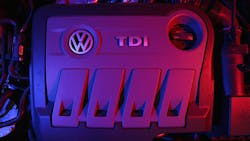A veteran Volkswagen AG engineer pleaded guilty to conspiring to defraud U.S. regulators and customers, the first criminal charge in the Justice Department’s year-long investigation into the company’s rigging of federal air-pollution tests.
It’s not clear whether the engineer, James Liang, who entered his plea in Detroit federal court on Friday, is cooperating with the investigation. That would increase pressure on higher-ranking officials of the Wolfsburg, Germany-based company.
Liang worked at Volkswagen for two decades, beginning in Germany and moving to the U.S. in 2008 — two years after the government says the conspiracy began. He appeared in court with a translator. He admitted to a single charge of conspiracy to commit fraud on U.S. regulators and customers and violating the Clean Air Act. He faces a maximum penalty of five years in prison when sentenced.
The U.S. is continuing its criminal inquiry into the company’s manipulation of emissions systems in its diesel cars to meet federal standards. The company has already agreed to settlements that may total $16.5 billion to get 482,000 emissions-cheating diesel cars off U.S. roads.
Settlement talks in the criminal matter against the company could be resolved by the end of the year, according to two people familiar with the matter. Germany and South Korea are also conducting criminal probes of the company.
After VW admitted last September that it had systematically rigged environmental tests since 2009, it suspended several engineers for their involvement in the scheme. They included several managers whom an internal investigation found had turned a blind eye to the effort.
In June, the German carmaker agreed to spend $15.3 billion to get a half million emissions-cheating diesel vehicles off U.S. roads. It agreed to devote as much as $10 billion to buy back affected models and compensate drivers. It also said it would pay $2.7 billion to federal and California regulators to fund pollution-reduction projects, and give $2 billion to be invested in clean technology.
The Justice Department a year ago put in place a policy requiring that all corporate cases include a plan to charge individuals — a policy that came amid criticism that company officials weren’t being held accountable even as the businesses paid billions of dollars in fines. The department has said companies that want credit for cooperating with investigators must name individuals whom they consider responsible for any misconduct.
Top-ranking auto executives have rarely been prosecuted in their companies’ scandals. In cases brought against General Motors Co. for ignition problems and Toyota Motor Corp. for uncontrolled acceleration, no high-ranking executives were accused of wrongdoing in the U.S.
VW still faces lawsuits by at least five states and by investors and dealerships in the U.S. There are parallel lawsuits, including consumer complaints, in Germany, all of which could raise the scandal’s price tag for the automaker.
Future expenses could include hundreds of millions of dollars in fees for the lawyers who secured the multibillion-dollar deal for car owners.
By Tom Schoenberg, Keith Naughton and Jamie Butters.
About the Author
Bloomberg
Licensed content from Bloomberg, copyright 2016.
